Cyclin G2 promotes cell cycle arrest in breast cancer cells responding to fulvestrant and metformin and correlates with patient survival
- PMID: 27753529
- PMCID: PMC5176157
- DOI: 10.1080/15384101.2016.1243189
Cyclin G2 promotes cell cycle arrest in breast cancer cells responding to fulvestrant and metformin and correlates with patient survival
Abstract
Definition of cell cycle control proteins that modify tumor cell resistance to estrogen (E2) signaling antagonists could inform clinical choice for estrogen receptor positive (ER+) breast cancer (BC) therapy. Cyclin G2 (CycG2) is upregulated during cell cycle arrest responses to cellular stresses and growth inhibitory signals and its gene, CCNG2, is directly repressed by E2-bound ER complexes. Our previous studies showed that blockade of HER2, PI3K and mTOR signaling upregulates CycG2 expression in HER2+ BC cells, and that CycG2 overexpression induces cell cycle arrest. Moreover, insulin and insulin-like growth factor-1 (IGF-1) receptor signaling strongly represses CycG2. Here we show that blockade of ER-signaling in MCF7 and T47D BC cell lines enhances the expression and nuclear localization of CycG2. Knockdown of CycG2 attenuated the cell cycle arrest response of E2-depleted and fulvestrant treated MCF7 cells. These muted responses were accompanied by sustained inhibitory phosphorylation of retinoblastoma (RB) protein, expression of cyclin D1, phospho-activation of ERK1/2 and MEK1/2 and expression of cRaf. Our work indicates that CycG2 can form complexes with CDK10, a CDK linked to modulation of RAF/MEK/MAPK signaling and tamoxifen resistance. We determined that metformin upregulates CycG2 and potentiates fulvestrant-induced CycG2 expression and cell cycle arrest. CycG2 knockdown blunts the enhanced anti-proliferative effect of metformin on fulvestrant treated cells. Meta-analysis of BC tumor microarrays indicates that CCNG2 expression is low in aggressive, poor-prognosis BC and that high CCNG2 expression correlates with longer periods of patient survival. Together these findings indicate that CycG2 contributes to signaling networks that limit BC.
Keywords: CCNG2; CDK10; Cell Cycle Arrest; Estrogen Deprivation; Fulvestrant; IGF-1R; Insulin; Metformin; RAF/MEK/MAPK pathway; Tamoxifen-Resistant.
Figures
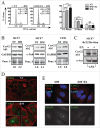
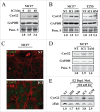
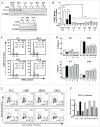
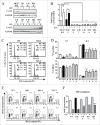
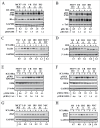
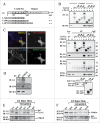
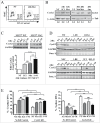
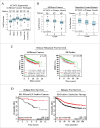
Similar articles
-
Elevated cyclin G2 expression intersects with DNA damage checkpoint signaling and is required for a potent G2/M checkpoint arrest response to doxorubicin.J Biol Chem. 2012 Jun 29;287(27):22838-53. doi: 10.1074/jbc.M112.376855. Epub 2012 May 15. J Biol Chem. 2012. PMID: 22589537 Free PMC article.
-
Roles of human epidermal growth factor receptor 2, c-jun NH2-terminal kinase, phosphoinositide 3-kinase, and p70 S6 kinase pathways in regulation of cyclin G2 expression in human breast cancer cells.Mol Cancer Ther. 2007 Nov;6(11):2843-57. doi: 10.1158/1535-7163.MCT-07-0109. Mol Cancer Ther. 2007. PMID: 18025271
-
AKT Antagonist AZD5363 Influences Estrogen Receptor Function in Endocrine-Resistant Breast Cancer and Synergizes with Fulvestrant (ICI182780) In Vivo.Mol Cancer Ther. 2015 Sep;14(9):2035-48. doi: 10.1158/1535-7163.MCT-15-0143. Epub 2015 Jun 26. Mol Cancer Ther. 2015. PMID: 26116361
-
Adaptive hypersensitivity to estradiol: potential mechanism for secondary hormonal responses in breast cancer patients.J Steroid Biochem Mol Biol. 2001 Dec;79(1-5):115-25. doi: 10.1016/s0960-0760(01)00151-0. J Steroid Biochem Mol Biol. 2001. PMID: 11850215 Review.
-
Killing the second messenger: targeting loss of cell cycle control in endocrine-resistant breast cancer.Endocr Relat Cancer. 2011 Jul 4;18(4):C19-24. doi: 10.1530/ERC-11-0112. Print 2011 Aug. Endocr Relat Cancer. 2011. PMID: 21613412 Free PMC article. Review.
Cited by
-
Knockdown of long non-coding RNA PVT1 inhibits the proliferation of Raji cells through cell cycle regulation.Oncol Lett. 2019 Aug;18(2):1225-1234. doi: 10.3892/ol.2019.10450. Epub 2019 Jun 7. Oncol Lett. 2019. PMID: 31423183 Free PMC article.
-
The landscape of exosomal non-coding RNAs in breast cancer drug resistance, focusing on underlying molecular mechanisms.Front Pharmacol. 2023 Apr 19;14:1152672. doi: 10.3389/fphar.2023.1152672. eCollection 2023. Front Pharmacol. 2023. PMID: 37153758 Free PMC article. Review.
-
Impact of Diabetes on Patient Outcomes in Breast Cancer Patients.Breast Care (Basel). 2022 Oct;17(5):480-485. doi: 10.1159/000524513. Epub 2022 Apr 11. Breast Care (Basel). 2022. PMID: 36684403 Free PMC article.
-
Cyclin G2 Inhibits Oral Squamous Cell Carcinoma Growth and Metastasis by Binding to IGFBP3 and Regulating the FAK-SRC-STAT Signaling Pathway.Front Oncol. 2020 Nov 6;10:560572. doi: 10.3389/fonc.2020.560572. eCollection 2020. Front Oncol. 2020. PMID: 33240810 Free PMC article.
-
Cyclin G and the Polycomb Repressive complexes PRC1 and PR-DUB cooperate for developmental stability.PLoS Genet. 2018 Jul 11;14(7):e1007498. doi: 10.1371/journal.pgen.1007498. eCollection 2018 Jul. PLoS Genet. 2018. PMID: 29995890 Free PMC article.
References
-
- Toss A, Cristofanilli M. Molecular characterization and targeted therapeutic approaches in breast cancer. Breast Cancer Res 2015; 17:60; PMID:25902832; http://dx.doi.org/10.1186/s13058-015-0560-9 - DOI - PMC - PubMed
-
- Patani N, Martin LA. Understanding response and resistance to oestrogen deprivation in ER-positive breast cancer. Mol Cell Endocrinol 2014; 382(1):683-94; PMID:24121024; http://dx.doi.org/10.1016/j.mce.2013.09.038 - DOI - PubMed
-
- Johnston SR. Enhancing Endocrine Therapy for Hormone Receptor-Positive Advanced Breast Cancer: Cotargeting Signaling Pathways. J Natl Cancer Inst 2015; 107(10); PMID:26251289; http://dx.doi.org/10.1093/jnci/djv212 - DOI - PubMed
-
- Hart CD, Migliaccio I, Malorni L, Guarducci C, Biganzoli L, Di Leo A. Challenges in the management of advanced, ER-positive, HER2-negative breast cancer. Nat Rev Clin Oncol 2015; 12(9):541-52; PMID:26011489; http://dx.doi.org/10.1038/nrclinonc.2015.99 - DOI - PubMed
-
- Zardavas D, Irrthum A, Swanton C, Piccart M. Clinical management of breast cancer heterogeneity. Nat Rev Clin Oncol 2015; 12(7):381-94; PMID:25895611; http://dx.doi.org/10.1038/nrclinonc.2015.73 - DOI - PubMed
MeSH terms
Substances
LinkOut - more resources
Full Text Sources
Other Literature Sources
Medical
Research Materials
Miscellaneous
